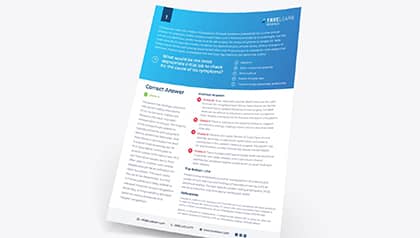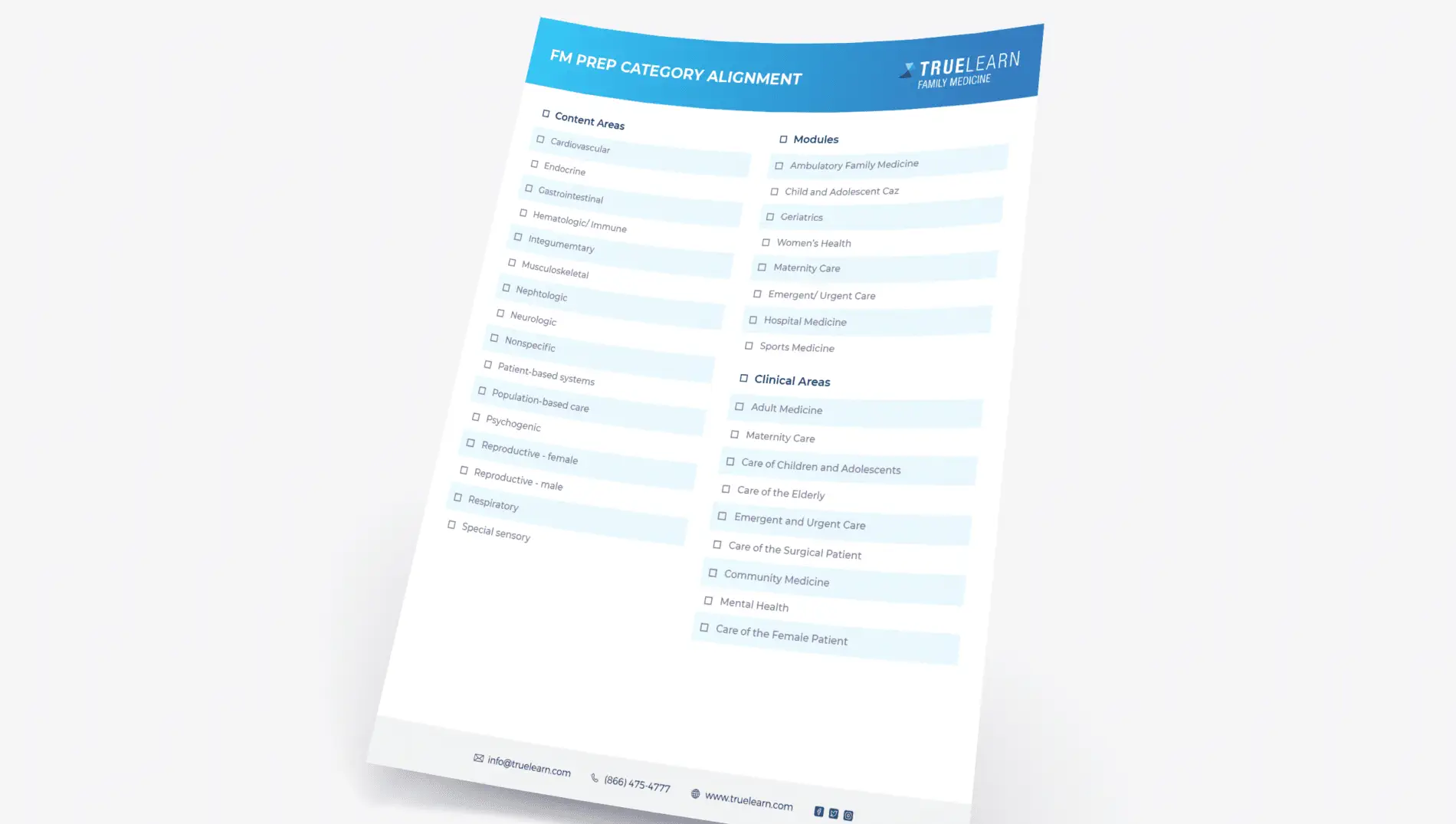How to Create Your NBCOT® Study Plan
Thinking about taking the NBCOT OTR® Exam can seem overwhelming, but studying for the exam is even more daunting and anxiety-provoking. Luckily, there are many tips and resources out there to help you come up with your NBCOT study plan. Here is a catch-all, synthesis of the 4-1-1 on how to properly study for the OTR® Exam!
First of all, there is not a one-size-fits-all approach to creating a study plan for this important test so let’s delve into ways to get started. I scoured the OT literature to find the best advice and this is what I found.
Initially you will want to be systematic by learning all there is to know about the NBCOT OTR® Exam and gathering other helpful preparation resources. You will also want to get organized in order to maximize your preparation time.
1. Get the NBCOT® Exam Handbook
Get a copy of the current NBCOT® Certification Exam Handbook and learn about the exam format, content, and scoring. Review all the resources that NBCOT® provides on its site.
Be sure you understand the requirements and how to register for the exam.
If you need an accommodation, leave plenty of time to pull together the paperwork.
The exam is based on entry-level practice: what an entry-level OTR® should know, as determined by NBCOT® surveys of entry-level practitioners. The focus is on applying what you know to clinical situations, not simple recitation of facts.
2. Explore and Collect Your OT Study Resources
Knowing what is out there to help you prepare will allow you to determine what works best for you. AOTA.org and NBCOT.org both offer resources to prepare for the exam.
Try out TrueLearn’s NBCOT-style practice questions. This question bank combines high-quality realistic practice questions, scenario-based items, cognitive research, and individualized testing behaviors to guide learning and increase performance on high stakes medical exams. And the topics are mapped to the NBCOT OTR® exam content outline.
There are many other resources on the Internet that appeal to all different types of studiers: flash cards, study guides, practice tests, etc. Take the time to explore these resources and find which ones best support the way you study, as they will be the most beneficial.
3 Tips for Choosing the Right Resources for You
- Decide whether you want to create a study group. How large should it be? Who should join? How will you work together, and how often? What are the members’ responsibilities?
- Think about what helps you learn. How do you learn best? Reading? Stickies? Watching videos? You may need to spend some time converting some of your study materials into a format that works best for you. Making flashcards and creating outlines (putting material in your own words) can be useful.
- Remember that the exam is online, so it can help you to work with materials on the computer.
Before trying to jump into studying, make sure you have all of the necessary study materials, such as textbooks, printouts, notecards, pens, paper, and any other resources you may be using. Nothing will make you feel more prepared than having everything you need in one organized and easily accessible place.
Did you know? TrueLearn offers Create-Your-Own Flashcards at no extra cost to help learners retain high-yield content more effectively.
3. Identify Any Knowledge Gaps
Once you have achieved those steps, then you can start preparing to study. A solid first move is to determine your knowledge gaps. Evaluate yourself. What are your strengths and weaknesses? Here are some tips that will do the trick!
- Learn what you need to study by taking practice tests and doing self-assessments to determine what topic areas you need to focus on.
- The TrueLearn SmartBanks also allow you to identify categories in which you underperform so you can create custom quizzes to focus on those areas.
Once you have narrowed down what you need to focus on, you can create your study plan. The scope of OT is large, which makes it difficult to study all topic areas in depth. You may not need to spend as much time on areas that you are more familiar with. Follow these helpful how-tos from to get you on the right track (McGuire, 2014; Polk, 2015)!
4. Decide How Long You Need to Study
Depending on when you want to test and how much review you need, 2 to 3 months maximum of steady, consistent effort should definitely be sufficient. Keep in mind that the longer you wait to take the exam, the less likely you are to remember the material you covered when you first started studying. Many students begin to study in their last semester before graduation.
5. Identify Activities or Days for De-Stressing
In a course exam, you know what the professor wants you to have learned. You have context on which to base your answer. The NBCOT® exam presents questions without any frame of reference. You could have a question on older adults in long-term care immediately followed by a question on school-based occupational therapy. The unknowns combined with the fact that this is a high-stakes exam will undoubtedly be stressful. Plus, a lot depends on your success!
Be cognizant of your mental state while studying and if the stress gets to be too much, have a plan for how you will de-stress. Maintaining a confident, calm state of mind is important.
Let’s Create Your NBCOT Study Plan
First, decide when you want to take the exam. Then you can map out a study plan working back from that date.
Everyone’s study plan will differ based on their learning style preferences, personal schedule, and anticipated date to take the exam. Write down a plan for how you intend to spend each day.
Here is a weekly NBCOT study plan template you can follow from an actual student who prepped for the exam.
- Monday: Take a timed practice exam to mimic the testing situation. Set up a testing environment to be similar to the actual testing environment (i.e., a quiet place, no cell phone, limited distractions). Remember you can take breaks during the NBCOT® exam, but the clock never stops. You have 4 hours to complete the test, and it doesn’t matter if you’re finished or have 20 questions left. In total, this student took 9 practice tests.
- Tuesday: Review the practice exam questions for 2 hours in the morning and 2 hours in the evening. Go through all 170 multiple choice questions and 3 clinical simulation test problems, and read the rationales for correct and incorrect answers. Keep a notebook and take notes while reviewing the material to keep track of strengths and weaknesses. Look up unknown terms. Review the notebook during the week.
- Wednesday, Thursday, Saturday, and Sunday: For two hours in the morning and two hours in the evening, study material from notes taken during the practice exams as well as other topics that are unfamiliar.
- Friday: FREE DAY!!
NBCOT® Study Tips
Look at your calendar and set aside time each week for studying. You know what time of day is most productive for you, so try to schedule your study sessions during that time.
Short, intense study sessions generally produce better results; you want to be able to remember what you studied. Several 30- to 45-minute sessions per week tend to work better than one or two long blocks of study time.
Write down your study “appointments” in an actual calendar. If you have to break an appointment, make it up during the week. Use a timer on your smartphone and if you stop early, add the remaining time to your next study session.
Decide what you are going to do in each session. For example, people using the True Learn Exam Prep platform might take a short practice test on a specific topic, review topic outlines and other resources in areas that are weak, and then take another test on the same topic to see how their score changes. Whatever it is, set goals for yourself every day. Making specific, achievable goals will ensure that you are being productive with your days. If you are not able to achieve your daily goal for any reason, make that time up. Treat your test preparation as if it were your job.
Tips for Using TrueLearn in Your Study Plan
To make learning easy and support long term retention the TrueLearn platform includes succinct and to-the-point Bottom Lines to improve contextual learning by reducing complex explanations into simple, easy to understand snippets—also known as the key learning point for each question. In addition, to make sure you don’t forget content on questions you got incorrect, TrueLearn interrupts what is known as the “forgetting curve” 3 days later by texting you that bottom line with our SmartTexts.
The TrueLearn system also has the ability to learn the students’ testing abilities and provide support and guidance to how you can improve your learning and testing behaviors through their Smartcard feature.
Take shorter practice tests so that you can absorb the information better. Practice tests that are 100 or 200 questions long will just tire you out. Build your testing endurance slowly–Remember, you don’t train for a marathon by running 26 miles every time you go for a run.
Advice from Former Test Takers
To help you keep going, below are some words of wisdom collected by actual students taken from posts from AOTA’s NBCOT® Exam Prep Info Center Facebook group (Lamoureux, 2015).
- “During the weeks leading up to my exam, I was consistently scoring in the 70th percentile on my practice tests, and I then knew it was time to schedule my exam.”–Caroline P.
- “I took [mental health] days and naps. Studying is exhausting. Listen to your body. My energy level picked up one week out”—Stacey G.
- “Listen to your body and take a break. There were a couple of times when I just had to take 3 days off to refresh.” Lindsay R.
- “I was feeling quite burnt out and hadn’t stuck to my exercise commitment… It helped me to make a point to go for short hikes, schedule a massage, do 10–15 of guided meditation, and plan some fun into the day. You may just need some recovery time!”—Emily C.
- “I worked and when I was at home I did things I enjoyed to take my mind off it. You need to recharge and be confident in all that I’m sure you know!”—Stephanie H.
- “I would focus on seeing myself sitting calmly, maintaining focus, being confident, breaking the questions down, and trusting my instincts. I also created a few positive affirmations that I would repeat to myself during meditations.”—Sarah D
Exam Day Preparation Checklist
If you have done everything correctly up to this point, created a solid NBCOT study plan and followed through on it, then you should be able to confidently say that you meet the each of the following.
- You know how to approach the exam questions. The exam is based on the process and practice of occupational therapy, which the NBCOT® divides into 4 domains for OTRs and 3 for COTAs. Understanding the domain to which a question is oriented can help you figure out how to answer it.
- Remember: It is about the ability to gather information about a client’s occupational performance, formulate conclusions into a treatment plan, and select occupational therapy interventions. It also is about understanding standards of practice and ethics. It is not about regurgitating facts; it is about applying clinical reasoning.
- You’re mentally ready for a 4-hour test. Although you can take breaks throughout the exam, you do not receive any “time-outs” to use the restroom, drink water, or eat snacks. Prepare your body and mind ahead of time to be able to be still and focus on the questions for that extended amount of time by building up to and taking at least one 4-hour practice test.
- You have a strategy for dealing with questions you cannot answer. No matter how well you prepare for the exam, a few questions will cause you to scratch your head. You’ll look at all the answer options and still have no idea how to answer. Planning ahead for such cases can reduce anxiety. A simple approach is to always pick the same answer (e.g., D), then mark the question for review so you can come back to it if there is time. Unanswered questions are unscored; any answer, even a wild guess, is better than none. There is no penalty for wrong answers, so picking an answer gives you a chance to earn credit for a correct answer. This approach also saves time.
- Your documents are gathered and organized the night before. You know what you need to bring to the testing center and have it all ready to go. Just to be safe, double check any instructions you have received and pull together everything you’ll need at the testing center—two forms of ID, your authorization to test letter, directions to the center, etc.
- Your physical and mental health are taken care of. You are calm, you are confident, and you’ve got this. Eat a good, healthy dinner the night before and get a good night’s sleep. Being well rested and able to think clearly is very important for maintaining confidence in your ability to pass.
Advice for Exam Day
I know it is easier said than done, but do whatever you need to do to try and relax on exam day. The day of the exam, do not crack open a book. Instead, choose something you enjoy–exercise, relaxed at Starbucks, anything to take your mind off the exam.
Here are some strategies from OT students to give you a leg up during the exam! (Lamoureux, 2015):
- Sometimes when you are in between 2 answers, ask yourself which one would be the more safe option for the patient/client [because]… safety first!”—Mya B.
- “Eliminate options that you already know are incorrect. The highlight feature helps to highlight words and such that may be beneficial to answering the question”—Jenna B.
- “Utilize the paper they give to draw, doodle, or write yourself positive reminders.”—Sarah H.
- “Read the question in its entirety. Then…read it again. Visualize the setting that is being presented to you. Breathe and relax. Good luck!”—Jenna B.
- “Read the questions twice, read all of the answers completely, break down the questions, and never change an answer unless 100 percent sure.”—Joseph C.
- “If ideas start to run together during the exam, take time to breathe. Use your breaks, too!”—Jennifer W.
- “When I first sat down I wrote [my name], OTR/L” on my white board and I wrote “I can do this. I will pass.”—Sarah J.
Best of Luck everyone! I know you will do great and become an OTR!
References
- Killen, E. (2017). Preparing to take the NBCOT® exam. OT Practice, 22(11), 24–25.
- Lamoureux, N. (October 2015). NBCOT® study tips roundup
- McGuire, D. S. (November 2014). Developing a successful NBCOT® study plan
- Polk, C. (June 2015). Steps to ace the NBCOT® exam


